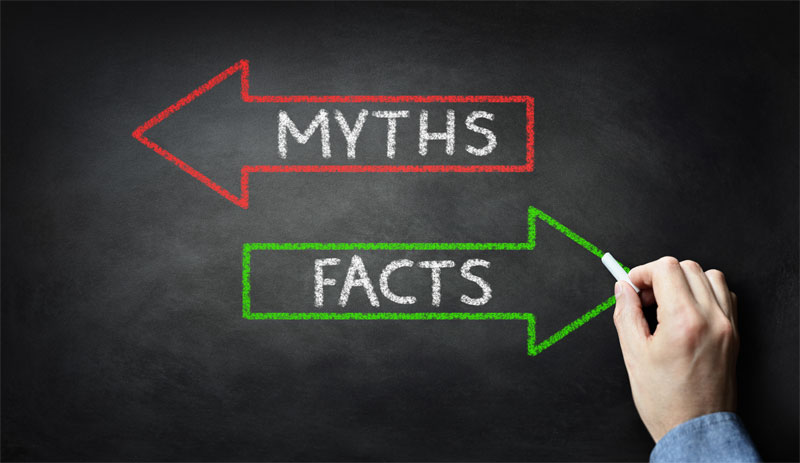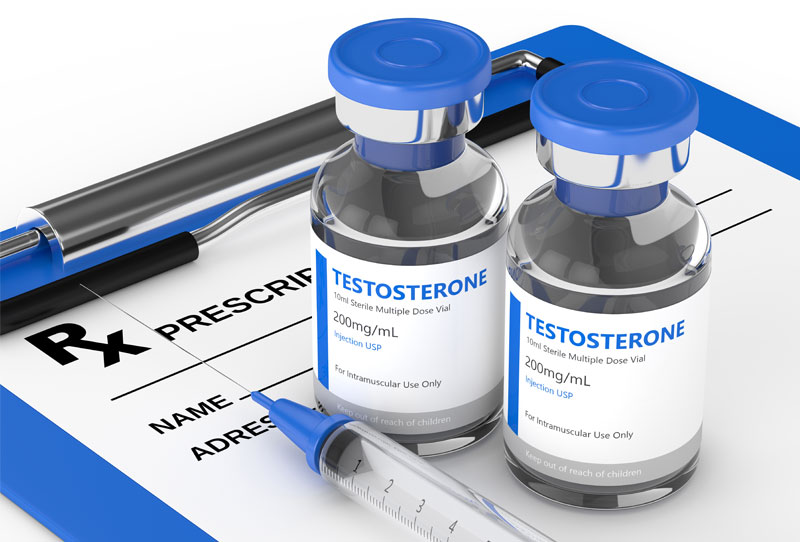- Home
- Growth Hormone
- Growth Hormone
- Growth Hormone Deficiency
- Growth Hormone Therapy
- Growth Hormone Injections
get startedThe Most Effective Hormone Replacement TherapiesTop 10 Myths About Testosterone
Testosterone is a vital hormone to your health and well-being. Testosterone is a male hormone, but women’s bodies make and need testosterone to maintain strength, endurance, and sexual health as well.
Testosterone levels decline as we age, causing a condition known as low testosterone, or “Low-T.” Both men and women over 35 could benefit from testosterone therapy. However, many people avoid the many life changing benefits of testosterone because there remain many myths and misconceptions about taking testosterone.
Here are 10 popular myths about testosterone.
1. Testosterone therapy is illegal – Because testosterone and similar anabolic steroids are banned in body building and other professional sports, there is a mistaken expression that taking testosterone is illegal. It is not. However, you do need a legitimate diagnosis of low testosterone, and a doctor’s prescription to legally obtain testosterone. Taking any product that contains testosterone without a doctor’s prescription is indeed illegal.
2. Testosterone can make men sterile – There is a persistent myth that testosterone replacement can cause a man’s testicles to shrink, and can make him impotent and/or sterile. This is not true. While there may be some shrinkage of the testicles when additional testosterone is first introduced, (because they decrease output in response) that side effect — if it even occurs — does not last long, and the testicles rebound shortly and go back to normal, as your body adjusts to the increased level of testosterone. As far as sexual performance goes, quite the opposite is true – testosterone actually improves libido, and sexual performance.
3. Testosterone can cause liver damage – Like many myths, this one has some basis in truth, but it really is no longer a valid concern. In the early days of testosterone therapy, testosterone was given in oral medications. In order to make testosterone taken orally, available to the body, it had to be formulated to be digestible by the liver. This did put additional strain on the liver. However, modern testosterone therapy bypasses the liver entirely, and is delivered direct into the bloodstream via injection, or cream, or gel.
4. Testosterone therapy makes men violent or aggressive – Testosterone therapy is designed to bring your testosterone levels — and indeed the levels of all of your hormones — back into proper balance. Mood swings and aggression are actually a sign of low testosterone. You will be carefully monitored during testosterone therapy to bring your levels into what is the normal range for you. In doing so, your moods will actually become more stable, and you will be less depressed, angry, or anxious.
5. Testosterone therapy causes prostate cancer – This is one of the most persistent myths about testosterone. It started because prostate cancer is known to “feed” off of testosterone, and the removal of the testes to deprive the cancer of testosterone – has been an accepted treatment for men with prostate cancer. However, testosterone can only make cancer progress more quickly in men that already have prostate cancer. There has never been a single medical study published that indicated that testosterone therapy can cause prostate cancer in an otherwise healthy man.
6. Testosterone therapy increases the risk of heart attack – Despite a lot of recent evidence to the contrary, a myth about testosterone that refuses to die is that testosterone therapy could increase the risk of cardiovascular disease. Not only have there been numerous studies that have now refuted this common myth, the latest research suggests that testosterone therapy can actually decrease the risk of stroke or heart attack. A recent study, of nearly 90,000 men, published in the European Heart Journal found that giving testosterone to men who have suffered a heart attack, helped to prevent a second heart attack or other cardiovascular issues.
7. Testosterone will turn you into a sex maniac – There are those that believe that taking testosterone will turn a man into an uncontrollable “sex fiend.” This is similar to the myth mentioned above – the mistaken belief that increased testosterone will make men more aggressive. Nothing could be further from the truth. Just as in the myth about aggression, carefully monitored and prescribed testosterone therapy can actually return men with sexual dysfunction due to low-t, to a happy and health sex life.
8. Testosterone will make women “manly” – Recent studies have found that testosterone can be very helpful for older women, particularly those entering the menopausal years. But, a lot of women shy away from testosterone therapy because they mistakenly believe it will make them too muscular, or otherwise too “manly.” In fact, when carefully prescribed, testosterone by improving muscle tone and skin health, can make women look younger, stronger, fitter, and more attractive!
9. Testosterone will make men look too muscular – Similar to the above myth, some men think that taking testosterone is going to have them pump up into a super-muscular body builder overnight. If a physique like a superhero is something you desire, perhaps – with the apropos weight and strength training – testosterone can help get you there. But, in and of itself, it does not automatically turn you from a “98 pound weakling” into a Captain America. Testosterone will help you lose weight and build muscle, and help you to look leaner, but you will only pack on as much muscle as you choose to, via exercise and training.
10. Testosterone causes hair loss – Another fear that sometime keeps people from taking testosterone is that it can make you go bald. Just as with many of the other myths mentioned here, this has grown out of the idea that in some cases, hair loss is a possible side effect of testosterone. However, that is usually in men that already have genetic predisposition toward male pattern baldness. Basically, it’s not the amount of testosterone you do or do not have that causes baldness; it’s your sensitivity of your hair follicles to another form of testosterone, called DHT, and that sensitivity is determined by your genes. So, again, with careful dosing and prescribing, hair loss is not usually a problem with most testosterone therapy patients.
So now that you know a lot more about the truth about testosterone therapy, do not let myths and misconceptions keep you from taking a step that may just change your life for the better!
Why not contact us today and find out if testosterone therapy is right for you?
- Growth Hormone Therapy



























